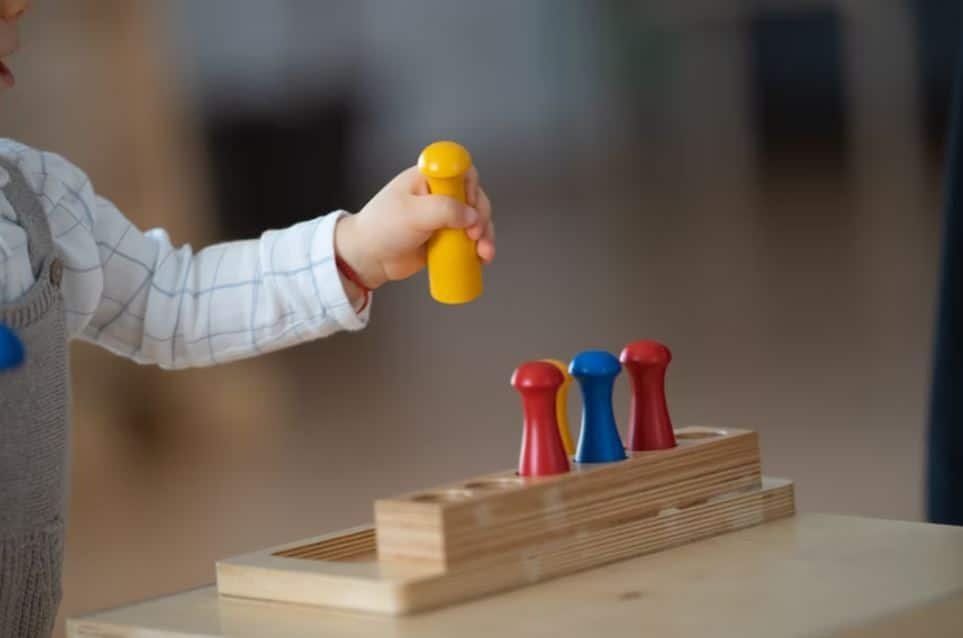Parenting
Montessori Toys: Guide to Unlocking Your Child’s Potential

Every parent wants their child to flourish throughout their developmental path and realize their greatest potential. By using Montessori toys, you may promote your child’s development in a powerful way. Hands-on learning, independence, and self-discovery are emphasized in a Montessori education. Toys made according to the Montessori principles give kids the chance to learn via exploration, interaction, and social, physical, and cognitive development. So, here are a few things you need to know about Montessori toys and how they can help your child reach their full potential.
Understanding Montessori Toys and their purpose
Maria Montessori, an Italian physician, and educator, founded the educational philosophies that are followed by Montessori toys. These toys are purposefully made to encourage independence, focus, and the growth of particular abilities. These toys promote Montessori’s idea that children learn best through independent play and exploration. They frequently use natural materials, such as wood, and have a straightforward form that encourages meaningful interaction between kids and them.
The ability to learn at their own pace, make decisions, and participate in activities that meet their developmental needs is one of the benefits of Montessori toys. These toys encourage active involvement and self-discovery by providing a hands-on learning experience. They will also help you to teach your child safety rules in a fun way. Montessori toys promote open-ended play, where there are no predetermined rules or results, in contrast to typical toys that could have predetermined uses or limited possibilities. This encourages critical thinking, creativity, and problem-solving abilities. The toys give kids the chance to experiment with many uses, which lets them use their imagination and maximize their potential.
Promoting independence and self-discovery
Fostering children’s independence is one of the main tenets of the Montessori educational philosophy. This objective is notably supported by Montessori toys. They encourage kids to participate in activities on their own since they are made to be readily controlled. A Montessori toy might, for instance, contain knobs or latches that kids can practice independently opening and closing. These toys support children’s confidence and sense of independence by offering chances for self-discovery and problem-solving.
Children have the freedom to explore and experiment with many concepts and ideas when they play with Montessori toys. They are urged to make decisions, which promotes a sense of independence and responsibility. Children take an active role in learning, as opposed to being passive recipients of information. They get a sense of agency via their interactions with Montessori objects, empowering them to take charge of their education and personal development.

Developing motor skills and coordination
Gross and fine motor abilities can be developed with the use of Montessori toys. These toys, which range from puzzles to building blocks, involve kids in tasks that call for hand-eye coordination, controlled movements, and control. A child’s motor skills can be developed by manipulating small objects, putting puzzle pieces together, or striking pegs on a pounding bench with a wooden hammer. Children can build hand strength, hand-eye coordination, and other skills necessary for future tasks like writing and drawing by participating in such activities.
Children can engage in tactile sensations and sensory inquiry with the help of Montessori objects. Children use their touch, sight, and occasionally sound senses to manipulate these toys. Children can develop their sensory awareness by, for instance, feeling the various sizes and textures of the blocks in a stacking toy. These practical activities not only awaken their senses but also aid in the growth of their fine motor abilities. Children improve their hand motions, dexterity, and coordination as they grasp, stack, and operate the toys.
Encouraging concentration and docus
A child’s complete growth depends on them learning to concentrate and focus in a world where there are endless distractions and stimulation. The purpose of educational Montessori toys is to hold a child’s interest and encourage ongoing participation. These toys are so basic that kids can concentrate entirely on the task at hand. The focused nature of these activities – whether it’s stacking blocks by size, stringing beads onto a string, or grouping objects by the color – helps kids build concentration abilities that they can utilize in various aspects of their lives.
Children can engage in tasks that call for consistent focus and attention with the help of Montessori toys. Children develop their ability to ignore outside distractions and concentrate on the work at hand by playing with these toys. For instance, a youngster might need to focus on finding the proper piece to finish a puzzle. They learn to focus for longer lengths of time as they become absorbed in the activity, which improves their attention span and focus. This ability is useful for daily tasks that call for continuous mental effort and focus as well as academic pursuits.

Promoting social skills and emotional intelligence
While Montessori education places a strong emphasis on individual learning, it also acknowledges the value of interpersonal communication and emotional intelligence. Children can practice empathy, turn-taking, and cooperative play with the help of Montessori toys. For instance, a pretend play kitchen set teaches kids to role play and play out scenarios, which helps them develop their social and emotional abilities. Children gain social skills and communication skills through the use of such toys.
The setting fostered by Montessori toys is ideal for the growth of a child’s social and emotional intelligence. Children learn to share, bargain, and assume various roles as they play pretend with others. As students put themselves in various situations and think about the emotions and viewpoints of others, they get a knowledge of empathy. In addition, group activities utilizing Montessori objects can help kids interact and work together with their classmates. These social contacts encourage the growth of crucial abilities like cooperation, communication, and dispute resolution.
Choosing Montessori Toys for your child
The age, developmental stage, and interests of your kid should all be taken into account while choosing Montessori toys for them. The following are some essential things to remember:
- Open-ended play: Seek out toys that support this type of play, in which there are no set guidelines or objectives. This fosters imagination and creativity.
- Natural materials: Choose toys made of organic materials like metal, wood, or fabric. These supplies are more environmentally friendly and offer a sensory experience.
- Real-life items: Choosing toys that mimic real-life items and activities, like miniature brooms, gardening tools, or musical instruments, is a realistic and useful strategy. This promotes meaningful interaction and the development of useful life skills.
- Multi-sensory experience: Look for toys with a variety of textures, colors, sounds, and scents to stimulate the senses. This encourages brain development and improves sensory exploration.
- Safety considerations: Make sure the toys you select are suitable for the child’s age and devoid of any small pieces that could be a choking hazard. Furthermore, look out for any potentially harmful compounds or jagged edges.
You can choose Montessori toys that suit your child’s interests and developmental needs by taking these considerations into account. Keep in mind that the objective is to give kids enriching and engaging experiences that foster learning and growth.
Fostering cognitive and language development
Children’s cognitive and linguistic development is significantly aided by Montessori toys. Many of these toys encourage logical thinking, critical analysis, and problem-solving. For instance, a youngster must observe, evaluate, and identify shapes in order to fit them into the appropriate holes on a shape-sorter toy. Children develop critical thinking skills and improve their cognitive capacities by playing with these toys. Additionally, Montessori toys frequently incorporate linguistic components, such as vocabulary associated with colors, shapes, or animals, supporting the development of young language skills and vocabulary.
Children can investigate and comprehend abstract ideas through the use of concrete, tangible Montessori objects. Children learn cognitive abilities like classification, sequencing, and problem-solving through practical experiences. As kids interact with Montessori objects, they run across problems that force them to problem-solve and use critical thinking. Children must examine and draw conclusions based on their observations when solving a wooden puzzle with different forms and sizes, for instance. The foundation for higher-order thinking and problem-solving abilities that will help them throughout their life is laid by these cognitive processes.
Additional benefits of Montessori toys
Montessori toys provide a number of other noteworthy advantages for kids in addition to the important elements covered above. First of all, these toys encourage a sense of organization and order. Many Montessori toys have trays or compartments for storing and sorting the various parts, which teaches kids the value of responsibility and neatness. Children gain valuable life skills and a sense of pride in their surroundings by participating in activities that require them to keep things clean and orderly.
Second, Montessori toys foster an appreciation for the natural world and the environment. These toys offer a link to the natural world because they are frequently manufactured from organic materials. Children can appreciate the beauty of the materials used by feeling the texture of the wood and smelling the aroma of the natural fibers.
Children who play with Montessori toys enhance their independence, cognitive development, motor skills, focus, social skills, and emotional intelligence. These toys enable your child to reach their full potential and create the groundwork for a passion for learning that will last a lifetime. Accept the power of Montessori toys and watch as your child’s development and growth soar. You may assist your child’s journey of self-discovery, creativity, and purposeful learning by providing them with these carefully chosen toys.













